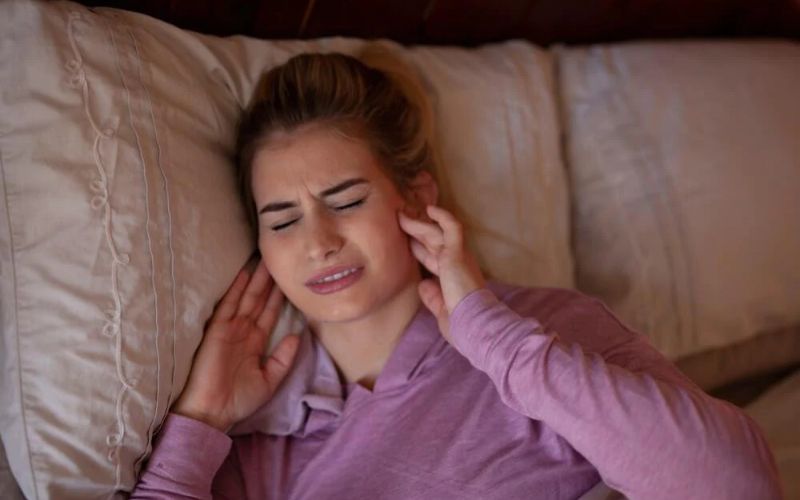Many people suffer from sleep grinding, a sleep disorder characterized by teeth grinding during the night. This disorder is manifested by unconscious grinding, clenching and grinding of the teeth at night which is called bruxism. Dental problems, jaw pain, headaches and sleep disturbances can all result from untreated bruxism. In this post, we will discuss some natural ways to stop the problem of teeth grinding during the night. Following these guidelines can benefit both the quality of your sleep and the condition of your teeth.
How to Stop Grinding Teeth in Sleep Naturally?
Deal With Anxiety And Stress
Teeth grinding during sleep can be a major symptom of stress and anxiety. Incorporating stress management practices into daily life can help reduce the frequency and severity of bruxism episodes. You may want to try some deep breathing exercises, yoga, or meditation to help you calm down. Relaxing in these ways can improve sleep and reduce teeth grinding.
Stick to a Regular Sleep Schedule
For those who suffer from nighttime teeth grinding, it is essential to establish a consistent sleep schedule. Maintain a sleep schedule of seven to eight hours a night. Keep up with regular rest and activity even on vacation days. If you want to get a better night’s sleep and reduce your chances of bruxism, try to make your bedroom as quiet and secluded as possible.
Stay Away From Stimulants
The problem of teeth grinding can get worse by consuming certain substances. Caffeine and alcohol are stimulants, so try to limit your intake, especially in the evening. In addition to increasing the likelihood of bruxism, these substances can disturb sleep. Instead, try drinking warm milk or herbal tea right before bed to help you relax and get a more restful night’s sleep.
Reducing the Tension on the Jaw and Face
The problem of teeth grinding can be reduced by reducing the tension on the jaw and face before sleeping. Do some stretching and massage to relax your jaw muscles. A warm compress applied to the jaw may also help to relax the muscles and reduce tension.
Wear a Mouthguard
Consider getting a mouthguard made so you can wear it while you sleep. Protect your upper and lower teeth from wear and tear by using a dental appliance designed for this purpose. If you want a mouthguard that fits snugly and protects your teeth, it’s best to see a dentist.
Find the Best Sleeping Position for You
The likelihood of teeth grinding while sleeping can be affected by the way you sleep. Sometimes, sleeping on the back can make the condition worse. To reduce jaw and muscle tension, try sleeping on your side or stomach. A body pillow or pillow between your knees can help you sleep in a comfortable position.
FAQs
Is stress the only reason for teeth grinding?
Although stress is a factor in bruxism, it is not the only possible cause of nighttime teeth grinding. Other causes of bruxism include difficulty sleeping, an irregular bite, and crooked teeth.
If I try to rest my jaw throughout the day, will this help me avoid grinding my teeth at night?
To stop teeth grinding, try practicing mindful relaxation techniques during the day to reduce muscle tension. If grinding of teeth at night is to be avoided then the causes should be resolved and other measures should be taken.
Can teeth grinding be stopped with natural remedies?
The short answer is “yes”, natural remedies can help with bruxism. Adherence to stress management, jaw relaxation techniques, and regular sleep has been shown to reduce the incidence of teeth grinding. However, for an accurate diagnosis and personalized treatment plan, it is always best to speak with a health care specialist or dentist.
Can I Trust OTC Mouthguards to Protect My Teeth?
It is possible to protect your teeth by using an over-the-counter mouthguard while you sleep. However, dentist-prescribed mouthguards provide better fit and comfort, maximizing their effectiveness against teeth grinding and clenching.
Can Bruxism Really Be Cured?
Although bruxism cannot be completely cured, it can be treated efficiently with a mixture of behavior modification, stress reduction strategies, and dental procedures. With the right method, the frequency and severity of teeth grinding incidents can be reduced to a great extent.
Is Bruxism Possible in Young Children (FAQ #6)?
Yes, bruxism can occur in young people too. It occurs most often in children and usually gets better without treatment. If you are concerned about your child’s teeth being worn down by grinding, a pediatrician will be able to advise you and monitor their teeth.
Conclusion
Night-time grinding can damage your teeth and affect your general health. Stress management, a regular sleep schedule and the use of protective devices such as mouthguards are all proven natural ways to reduce the problem of teeth grinding. Always seek the advice of a doctor or dentist for an accurate diagnosis and tailored treatment strategy. The proper strategy can help you get better rest and preserve your beautiful smile.
